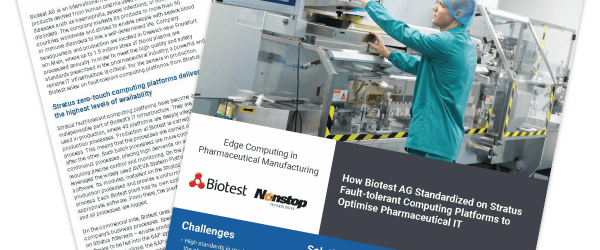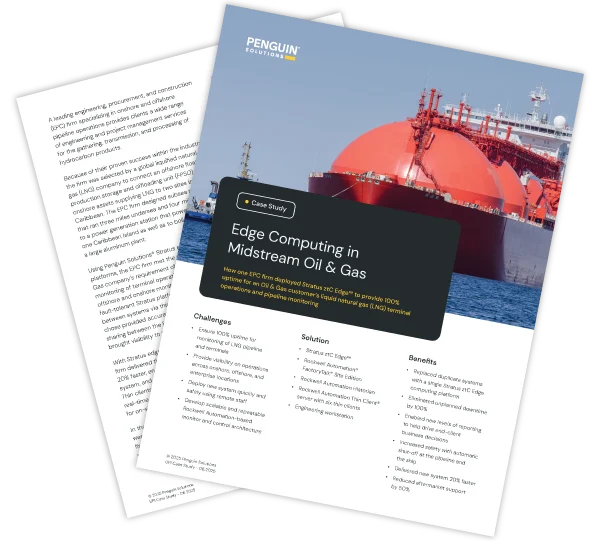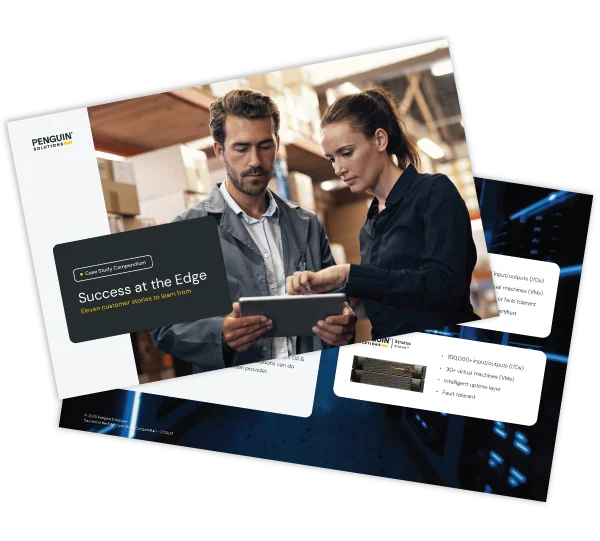AI & HPC Data Centers
Fault Tolerant Solutions
Integrated Memory

Showing 80 Case Studies

The AI Makerspace expands Georgia Tech’s foundational, theory-focused AI curriculum by offering students a hands-on platform to tackle real-world AI challenges, develop advanced applications, and present their AI-driven ideas at scale.
The AI Makerspace expands Georgia Tech’s foundational, theory-focused AI curriculum by offering students a hands-on platform to tackle real-world AI challenges, develop advanced applications, and present their AI-driven ideas at scale.

How Biotest AG Standardized on Stratus Fault-Tolerant Computing Platforms to Optimize Pharmaceutical IT

Stratus computing platforms were foundational in helping this oil & gas company meet new cyber mandates, consolidate workloads, reduce TCO and organizational siloes, improve communications and data management, and scale deployments with ease across multiple locations and sites.

Voltage Park, a next-gen cloud company, selected Penguin Solutions as its managed services partner to manage and maximize the efficiency of their large AI infrastructure. Penguin has large scale infrastructure experience to ensure maximum GPU performance and cluster availability to meet the needs of Voltage Park customers.
Voltage Park, a next-gen cloud company, selected Penguin Solutions as its managed services partner to manage and maximize the efficiency of their large AI infrastructure. Penguin has large scale infrastructure experience to ensure maximum GPU performance and cluster availability to meet the needs of Voltage Park customers.

These 12 customer success stories showcase how organizations, ranging from Oil & Gas to discrete manufacturing and pharma, leverage Edge Computing to modernize infrastructure, run mission-critical applications without downtime, and build future-proof control architectures for long-term success.

How Stratus Edge Computing is a Paradigm Shift for the Modernization of Chemi's Pharmaceutical Plant.

Immersion-cooled AMD CPU-powered Penguin Solutions Altus™ servers and renewable power unlock new efficiencies for high-performance computing.

How EOSYS modernized a global specialty chemicals manufacturer’s batch infrastructure in 10 weeks using Stratus Edge Computing to eliminate downtime and simplify future manageability

SDI Element Logic brought its warehouse management solutions to new heights eliminating downtime, reducing IT costs, and surpassing customer SLAs with greater than 98% accuracy using the power and reliability of Stratus Edge Computing. Read more in our case study.

To keep up with rapid growth, this large midstream Oil & Gas company standardized on Stratus Edge Computing platforms to digitally transform terminal and pipeline automation. They eliminated downtime, reduced workload for IT and OT, increased asset lifecycles, and more.

A leading EPC firm specializing in onshore and offshore pipeline operations were contracted by a global liquified natural gas company to connect an offshore FPSO to onshore assets. To help, the EPC firm leveraged Stratus Edge Computing, achieving 100% uptime.

ILME maintains 30 years of expertise and improves performance with the new Stratus V Series and Stratus ftServer.

A leading life sciences company needed to eliminate downtime and data loss to avoid costly disruptions and ensure regulatory compliance. They engaged Rovisys, a global system integrator, who deployed Stratus Edge Computing platforms. Learn more in this case study.

QuarterNorth Energy, a leading oil and gas company, needed to modernize centralized control and safety systems, reduce costly downtime, and optimize operational resilience to be successful in their competitive industry. To do so, they engaged Enginuity Global and Stratus Technologies.

The Stratus SI Compendium showcases 8 case study examples where SIs have leveraged Edge Computing to deliver scalable, trusted - and profitable - solutions to their end users.

Petra Srl, one of Italy’s largest oil depots, automated manual processes and integrated disparate terminal systems to reduce risk, enable real-time data, and centralize visibility of operations. Download this Case Study to learn how Stratus Edge Computing and Loginet helped.

Discover how Dynamic Controls Inc. (DCI) leveraged Stratus Edge Computing and Schneider Electric Ecostruxure to help a data center customer optimize operations, improve reliability, and extend visibility across the organization.

How Stratus Edge Computing Enabled Rubberlite to Eliminate Downtime, Lower IT Costs 50%, and Reduce Non-Sellable Material by 80%.

For most industries entering the final stages of their life cycle, investment in infrastructure would be nonsensical. For Ruhrkohle AG (RAG), Germany’s leading domestic coal producer, it was absolutely essential. Lives, landscapes, livelihoods, equipment, reputation and income depended upon it.

How DC Water Architected Stratus Edge Computing Platforms to Provide Double Redundancy and Reduce System Failover Time by 90%

This compendium represents a series of Edge Computing case studies and success stories from companies working with Stratus. Learn how Stratus' Edge Computing solutions helped organizations across an array of industries simplify, protect and automate their digitally transforming business-critical operations.

How Streamline Innovations uses Stratus Edge Computing to bring AI-powered predictive maintenance, remote operation, and 99.5% uptime to remote oilfield equipment.

Stratus Edge Computing Platform Enables Powder Processing Solutions Provider to Enhance Visibility of Operations and Improve Business Continuity.

How Alewijnse Developed the Maritime Industry’s First Future-Proof Digitalization Platform for Critical Ship Systems and Reduced Computing Footprint 75%.

How Breton’s Next-Gen Stone Processing Machines Incorporate Stratus ztC™ Edge to Prevent Unplanned Downtime for Customers Edge Computing and Machine Builders.

Stratus everRun provides high availability and redundancy for business critical systems at world’s largest mobile operator.

Founded in 1977, San Jye focuses on precision machinery sheet metal, customized sheet metal for medical assistive devices, and electronics semiconductor fields. Their focus is on long term innovation and high-quality products, made possible through technology.

For Shougang Jingtang Iron & Steel United Co. Ltd., the continuous availability solution reduced the cost of software and system upgrades, significantly reducing the total cost of the project.

The Bradbury Group of manufacturing companies are dedicated to producing high-quality, productivity-enhancing metal processing equipment for customers around the world. They were looking for flexibility, reliability and ease of use.

In order to meet the requirements of continuous availability, ease of use, and cost reduction, the Shanghai port company set out to evaluate downtime prevention solutions.

China’s largest full-service investment bank relies on Stratus® ftServer® to ensure continuous securities trading.

China’s largest full-service investment bank prevents offer system downtime using the Stratus® ftServer® continuous availability solution.

Scott Bader was established in 1921 and today is a £227 million-pound global chemical company, employing more than 650 people worldwide. With manufacturing sites located around the world it manufactures, sells and distributes a wide range of synthetic resins and polymers to many different markets and has built a reputation for innovation, quality and excellent customer service.

A leading TV panel supplier and a subsidiary of TCL Group, Shenzhen China Star Electronics Technology, Co., Ltd. (CSOT) first began production in 2009 as one of China’s independently-built, highestgeneration thin-film-transistor liquid crystal display (TFT-LCD) manufacturing facilities. The single largest plant in Asia, the company’s 600,000-square meter factory runs two Gen 8.5 lines capable of producing panels as large as 55 inches. These lines boast the highest single-unit productivity and efficiency in the world.

Part of the Far Eastern Retail Group, HAPPY GO is Taiwan’s first reward platform with cross-industry membership at its core. HAPPY GO cards empower consumers to earn reward points and receive special discounts when making qualified purchases. The platform’s behavioral analysis and integrated smart marketing capabilities drive channel stickiness by generating targeted promotions that reflect consumer lifestyles and preferences. Since its establishment in 2004, HAPPY GO has achieved widespread market penetration across Taiwan, China and Japan. Today, over 12,000 brands and more than 800,000 online and physical stores use HAPPY GO to connect with consumers.

Pinellas County (FL) Utilities delivers 71 million gallons of clean water and treats 30 million gallons of wastewater daily for one million year-round residents and 4.2 million visitors to St. Petersburg and the county’s 23 other communities. To do that, it manages 2,000 miles of pipe, 13 well fields, five surface water sources, three wastewater treatment facilities and 350 lift stations.

Russian River Brewing Company uses Stratus’s everRun® for production control allowing brewmaxx by ProLeit to run without downtime.

Located in Milton, Delaware, the Dogfish Head facility is responsible for the craft beer and spirits of the brand. Having opened its doors in 1995 the rapidly growing brewing company now produces 262,000 barrels of beer annually and while its challenges aren’t unique, the impact of any downtime could be a business-life changer.

North America’s first fully digital medical facility, Humber River Hospital leverages the latest technology to deliver a seamless, paperless, and connected experience for patients, staff, and clinicians. Facility relies on the Stratus® everRun® downtime prevention solution for always-on video security management.

New controllers, software and network architecture deliver more robust cybersecurity, higher performance, easier diagnostics and significantly enhanced data capture.

Huaqiao Toll Station is located in the territory of Kunshan and Suzhou cities at the border of Jiangsu province and Shanghai along a major land access route connecting Shanghai and Jiangsu provinces in northern China. With a two-way traffic flow of nearly 80,000 vehicles passing through its 31 toll lanes every day, this toll station is the busiest entrance/exit point along the Shanghai-Nanjing Expressway.

Jinhua Duohu Central Business District Construction Investment Co., Ltd. is tasked with overseeing development of Jinhua’s underground utility pipeline in accordance with international standards and putting the state-of-the-art tunnel into full operation by 2020. A utility pipeline of this scope hosts a multitude of systems to monitor and control. To maintain safe, secure, and efficient tunnel operations, the company needed a highly reliable, fault-tolerant solution to provide continuous availability and remote access to tunnel systems via PC and mobile devices.

As the CAAC/ATMB prepared to test a next-generation version of the ADS-B system, technical leaders decided to implement a high availability solution to eliminate single points of failure and ensure continuous system operation for always-on air traffic monitoring.

Hangzhou Jiuxi Water Plant, which has a designed capacity of 600,000 m3/d, is the largest waterworks in Zhejiang Province. In production since June 2000, this modern environmental water treatment facility leverages the most advanced technology and equipment to support filtration methods and meet stringent government standards for water purity.

Tomoe Dairy Processing relies on Stratus ftServer System to ensure a continuously available production line.

Chinese pharmaceutical company achieves always-on temperature and humidity monitoring in its state-of-the-art facilities with the Stratus® ftServer® system.

The theme park resort is expected to attract more than 25 million visitors a year, so the benefits of Stratus’ ftServer platform for the resort’s water treatment system speak for themselves.

State-owned securities company achieves continuous availability of its core trading system with the Stratus® ftServer® platform.

A busy cultural complex in uptown Tokyo, Nakano Sunplaza relies on the Stratus® ftServer® platform for continuous availability of its virtualized applications to keep back-office and customer facing operations running smoothly and profitably.

A flagship hospital in Honshu, Japan uses Stratus® everRun® to achieve high availability of its laboratory testing system while reducing operational burden and laboratory system downtime.

Looking to make use of IoT technology, the company employed Stratus Technologies’ fault-tolerant server, ftServer, in its ICT infrastructure. An information sharing system that helps an innovative manufacturers like Hagihara Industries create comfortable environments with flat yarn.

To ensure the safety of the town’s residents, the police department requires 24/7 availability of their mission-critical public safety computer applications including computer-aided dispatch (CAD), arrest booking program, detective case management, and records management system for accident reporting.

When the IT system for Alunorf, the world’s largest aluminium rolling and casting plant, was discontinued a few years ago, the organization set out to and a replacement system. The management and control of both its pit and pusher furnaces were dependent upon it. After considering a cluster system, Alunorf eventually chose a system built on fault-tolerant servers from Stratus Technologies.

KapStone Paper and Packaging makes unbleached kraft paper that goes into the packages, wraps and surfaces that are part of everyday life. Their mills operate around the clock and together are capable of producing 1.3 million tons of paper annually. When KapStone bought mills from their previous owners, each mill had a manufacturing execution system (MES) that had been in place for nearly 20 years. The facilities were already looking at technology to replace the outdated systems.

A natural gas gathering and treating company was losing hundreds of thousands of dollars a month in imbalance sheet accounting due to its inability to accurately monitor data from the point of extraction through distribution. Their old technology that used RS232 communications with standalone SCADA was slow and frequently failed, crippling their systems.

Ensuring sufficient high quality drinking water to meet the requirement of consumers requires absolute availability of a complex plant infrastructure at all times. When Düsseldorf Water Authority decided to review its infrastructure it considered hosting its control room servers on either cluster systems or fault tolerant servers.

Stratus® ftServer® system helps remote Alaska hospital achieve continuous availability of critical systems and data. Read on to learn how Samuel Simmonds Memorial Hospital uses Stratus ftServer for continuous availability of EHR critical systems.

Global metal components manufacturer keeps business-critical applications up and running—all the time—with Stratus® everRun® Enterprise.

Perfect plants depend on SAP SOFTWARE AND STRATUS SERVERS to address planned and unplanned downtime.

As one of the nation’s premier research institutions, Northwestern needs to ensure that all building control systems are continuously operational in order to maintain highly stable environments. Even the slightest variability in conditions like temperature, humidity, air flow, and air quality can skew scientific findings and render ongoing research work useless.

Pulse Systems and Stratus Technologies offer a future-proof foundation for electronic health record (EHR) implementations.

A rapidly growing Las Vegas airport relies on Stratus® everRun® software to prevent baggage handling and security system downtime. Read on to learn why McCarran International Airport chose everRun for their security system downtime prevention solution.

As part of its ongoing effort to maintain sustainable operations and improve delivery of services, Marion County Public Safety decided to consolidate its multiple police, fire, and EMS agencies on a single county-wide communications system.

Since 1986, J. Knipper and Company, Inc. has been known throughout the pharmaceutical industry for developing and delivering smart, effective, and efficient commercial solutions. Learn why J. Knipper and Company chose Stratus everRun for its real-time synchronization solutions.

MAN Nutzfahrzeuge is one of Europe’s leading vehicle manufacturers. The company offers a range of innovative and reliable trucks and buses, which aim to set the standard in all of their market segments.

One of the world’s largest automotive manufacturing producers of trucks, Tokyo-based Isuzu Motors Limited, is also a leader in manufacturing diesel engines for trucks and buses. Isuzu’s facility in Fujisawa, Japan is one of the company’s main production points for building its SUVs, mid-sized trucks, and a pickup truck line that serves a joint venture with General Motors.

H2OUptime, H2OSatellite’s new marinized server network, came about following a period of research and development focused on finding a way to replace the high-risk PC networks common to most ships, with a more secure and resilient network system.

After evaluating various high availability solutions, Hanchuan People’s Hospital decided to implement Stratus everRun downtime prevention software on virtualized Dell™ and IBM® x86 servers.

Enjoying 37% year on year growth for five years, DGCX upgraded its infrastructure, setting its sails for record growth.

Frigoscandia SPA delivers 17 million cartons of frozen food to the Italian market every year. Confident in its ability to grow its market share, the company invested in new premises and updated IT infrastructure with Stratus’ uptime solutions.

co.don® AG is a leading biopharmaceutical company, instrumental in the areas of tissue engineering and regenerative medicine. The company needed continuously available servers to be able to store pharmaceutical compliance data, research data, and financial information.

The airport added a new Centralized Command and Control Center (C4) to expand its preparedness. The C4 provides a single point for managing incidents on its 4,700 acre campus, and one central place that people can call.

National South African pharmaceutical group relies on Stratus to ensure dispensary and POS solutions are always-on.

Lebanon Police Department upgraded its computing infrastructure to run all applications, including its emergency CAD, traffic reporting, police use of force, and document and record management systems, on virtualized industry-standard x86 servers in its on-site data center.

With customers demanding around-the-clock access to secure, real-time financial transactions across multiple delivery channels, even the briefest period of unplanned system downtime could negatively affect thousands of customers, damage CMB’s reputation and result in potential revenue losses. CMB decided to establish its server infrastructure with state-of-the-art, fault-tolerant servers in order to achieve continuous availability of its virtualized core banking applications.

Aristocrat had begun to use a new gaming application called Multi-Site Progressive (MSP) System, where slot machine players at casinos around the U.S. are connected, permitting them to play for combined jackpots. The Nevada Gaming Control, the state regulatory agency, requires redundancy in these systems to minimize downtime on the jackpot links.

A centralized next generation data center was required in order to provide EMS with a fault-tolerant, disaster recovery capable underlying infrastructure based on a private cloud solution designed to ensure 24/7/365 availability to call takers, dispatchers, responders and citizens.

With more than 40 years of switchgear industry experience, over 250 employees and an annual turnover in excess of £30 million, AF Switchgear Ltd provides flexible and economic solutions to suit all switchgear and control applications including HV Equipment & Package Sub Stations, Main LV Distribution Switchgear, Sub LV Distribution Switchgear and more.

Albian Sands needed a reliable and efficient way to maintain its automation system at the processing facilities. Downtime is expensive and there are many people and automation components involved in keeping the processing facilities running.

Makro South Africa (SA) had hosted its credit and debit card processing service on Stratus® ftServer® systems since their previous server failed them for two hours in 2005.